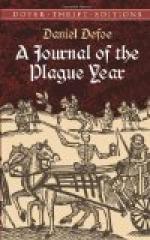It remains to give some account of the state of trade at home in England during this dreadful time, and particularly as it relates to the manufactures and the trade in the city. At the first breaking out of the infection there was, as it is easy to suppose, a very great fright among the people, and consequently a general stop of trade, except in provisions and necessaries of life; and even in those things, as there was a vast number of people fled and a very great number always sick, besides the number which died, so there could not be above two thirds, if above one half, of the consumption of provisions in the city as used to be.
It pleased God to send a very plentiful year of corn and fruit, and not of hay or grass, by which means bread was cheap by reason of the plenty of corn, flesh was cheap by reason of the scarcity of grass, but butter and cheese were dear for the same reason; and hay in the market, just beyond Whitechapel Bars, was sold at four pounds per load; but that affected not the poor. There was a most excessive plenty of all sorts of fruit, such as apples, pears, plums, cherries, grapes; and they were the cheaper because of the wants of the people; but this made the poor eat them to excess, and this brought them into surfeits and the like, which often precipitated them into the plague.
But to come to matters of trade. First, foreign exportation being stopped, or at least very much interrupted and rendered difficult, a general stop of all those manufactures followed of course, which were usually brought for exportation; and, though sometimes merchants abroad were importunate for goods, yet little was sent, the passages being so generally stopped that the English ships would not be admitted, as is said already, into their port.
This put a stop to the manufactures that were for exportation in most parts of England, except in some outports; and even that was soon stopped, for they all had the plague in their turn. But though this was felt all over England, yet, what was still worse, all intercourse of trade for home consumption of manufactures, especially those which usually circulated through the Londoners’ hands, was stopped at once, the trade of the city being stopped.
All kinds of handicrafts in the city, etc., tradesmen and mechanics, were, as I have said before, out of employ; and this occasioned the putting off and dismissing an innumerable number of journeymen and workmen of all sorts, seeing nothing was done relating to such trades but what might be said to be absolutely necessary.
This caused the multitude of single people in London to be unprovided for, as also of families whose living depended upon the labor of the heads of those families. I say, this reduced them to extreme misery; and I must confess it is for the honor of the city of London, and will be for many ages, as long as this is to be spoken of, that they were able to supply with charitable provision the wants of so many thousands of those as afterwards fell sick and were distressed; so that it may be safely averred that nobody perished for want, at least that the magistrates had any notice given them of.




